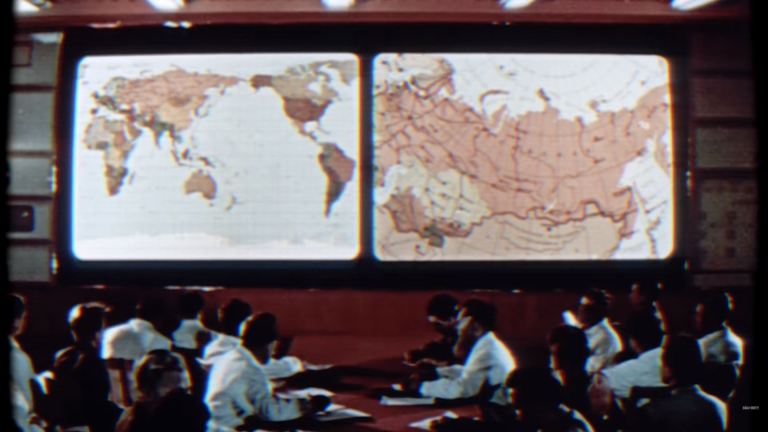Call of Duty Black Ops: Cold War – Who is Perseus?
Who is the mysterious Perseus referenced in the Call of Duty Black Ops: Cold War trailer? Here's everything we know about the legend and the truth:

The Call of Duty Black Ops: Cold War trailer not only demonstrated the fascinating ideas of KGB defector and noted journalist Yuri Bezmenov, but also briefly referenced the name “Perseus” as one of the presumed key players in the game’s story.
Of course, that trailer no doubt has many of you asking a very simple question: “Who is Perseus?”
The question may be simple, but the answer is anything but. The name Perseus is one of the most mysterious remnants of the Cold War era (and beyond) as well as a favorite among among conspiracy theorists who consider Perseus to be a potentially major missing piece of a grand puzzle.
We’ll try to fill in a few of those pieces ourselves as we look at the meaning of the name Perseus, their role in the Cold War, and even their possible upcoming role in Call of Duty Black Ops: Cold War.
The Legend of a Spy Named Perseus
The name Perseus is cited in several official documents, including some that come from KGB archives which were first made available to foreign researchers in the early ’90s. There are also references to a “PERS” in documents related to the Venona project: an extensive counterintelligence effort initiated by the United States during World War 2.
Most notably, the name Perseus is used to identify a Soviet operative who reportedly participated in an assignment at Los Alamos: the site of the infamous Manhattan Project which eventually resulted in the production of the first nuclear weapons. The name was also mentioned by people like Lieutenant General Pavel Anatolyevich Sudoplatov (a high ranking Soviet intelligence official) and Colonel Vladimir Chikov who named Perseus in their writings and, in some cases, cited them as a still active and unidentified operative.
The story goes that Perseus was one of the four operatives involved with a Manhattan Project espionage mission which Russia infamously conducted in the 1940s using insiders working at the facility. While three of those operatives (Klaus Fuchs, David Greenglass, and Theodore Hall) were eventually caught, legend has it that Perseus was a fourth agent involved in that operation who spent decades eluding capture. Some even suggested that he was an insider deep within the program who American officials were afraid to ever expose despite catching him.
The legend of Perseus has grown into mythical proportions over the years largely due to the fact that the name was often referenced by top Soviet intelligence officials, but nobody has ever been able to definitively identify who Perseus actually was (at least in the minds of everyone). That cocktail of confirmation and mystery has made the Perseus story one of the more compelling conspiracies of the Cold War.
Was Perseus Real?
While the name Perseus (or the code “PERS”) is certainly real, many signs point to the distinct possibilities that there never really was a Perseus or that Perseus was not a lone operative.
For instance, KGB General Pavel Sudoplatov denied the existence of an operative named Perseus by suggesting that former intelligence officer Anatoli Yatskov (one of the officials who used the name Perseus in previous writings and interviews) was either misremembering the name or otherwise using it to help cover for someone else. In a 1996 interview, Vladimir Chikov also said of Perseus that “The main goal was to make the story unclear, so when the intelligence of other countries began to analyze this, it would not reveal the forms and methods of the work of Soviet intelligence.”
A similar theory is shared by the CIA who published a paper called “On the Trail of a Fourth Soviet Spy at Los Alamos” which concludes that “there was no Perseus” and the name was “a Soviet/Russian intelligence disinformation operation to protect Theodore Hall (the real Mlad), then still alive but not publicly exposed as a Soviet spy.” The paper also indicated that there was a fourth spy in the operation but that he was eventually identified by the FBI as an insider named Oscar Seborer.
At one point, Jeremy Stone, former President of the Federation of American Scientists, claimed that MIT professor Philip Morrison was actually Perseus. However, when Morrison pointed out the various reasons why his life could not possibly match the then-popular details of Perseus’ life, Stone formally withdrew his accusation and apologized.
Despite certain evidence to the contrary, the theory that Perseus is indeed a traditional operative in the style of a James Bond-like spy (who may even still be alive) remains a popular one. While much of the evidence to support those claims is circumstantial and requires you to buy into the idea of a massive cover-up, the romanticism of the idea and the ways in which it matches our views of traditional Cold War spies makes it an undeniably compelling concept.
What Role Will Perseus Play in Call of Duty Black Ops: Cold War?
At this time, we do not know what role Perseus will play in Call of Duty Black Ops: Cold War despite the fact that the name is so prominent in the game’s debut trailer. However, the fact that Perseus was used at all seemingly reveals a few key things about the upcoming sequel’s plot.
First off, Perseus’ most infamous “assignment” (the Manhattan Project, which is even referenced in the trailer) occurred during World War 2. While we’ve heard reports that Cold War will deal with the events and fallout of the Vietnam War, the use of Perseus suggests that it will also deal with the events of World War 2. While the most logical conclusion would point to a flashback sequence or even just a casual reference, we previously discussed how the use of Yuri Bezmenov in the trailer also suggests that the game’s timeline may cover quite a few years. If that is the case, then it’s entirely possible that Perseus’ role will be more direct.
More importantly, the reference to the Manhattan Project meshes with a previous Easter egg revealed in Warzone which featured a secret Russian bunker and a seemingly inactive nuclear warhead. Some have taken this as a sign that Call of Duty‘s version of the Cold War may go hot, but all of this certainly points to the idea that the game will deal heavily with the concepts of espionage and propaganda.
Finally, there’s the theory of an alternate timeline. Black Ops games of the past have used alternate timelines to great effect, so there’s a strong possibility that Cold War will showcase a world in which Perseus was not only a real person but a highly successful spy whose actions changed the course of history as we know it. The fact that the game’s trailer seemingly suggests that Yuri Bezmenov tried to warn us about Perseus (which doesn’t seem to be strictly true, at least in the interview they used) further hints at this possibility.
Speaking of previous Call of Duty games, this isn’t even the first time that the franchise has featured a character named Perseus. One of Black Ops 4‘s Zombie mode maps featured an antagonist named Perseus (who is also used as part of that mode’s lore), but that character was based on the Greek mythological figure of the same name. We doubt that’s the angle that Cold War will pursue.
Whatever the case, we remain intrigued by Call of Duty Black Ops: Cold War‘s initial premise and look forward to seeing more of it as the game nears its release sometime later in 2020.

